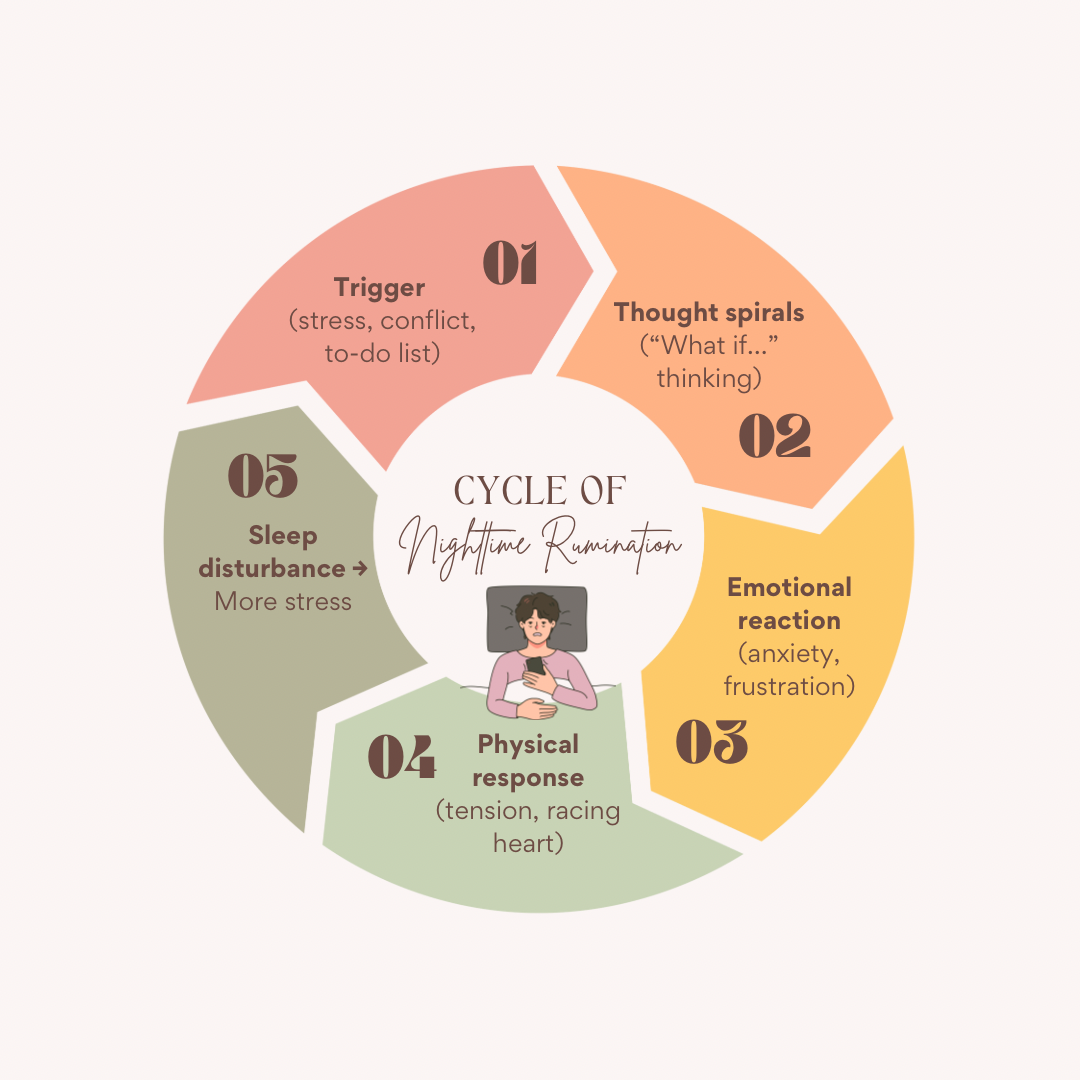If your brain seems to come alive with worries and overthinking the moment your head hits the pillow, you’re not alone. Nighttime rumination is a common experience, especially for those dealing with anxiety, stress, or emotional overwhelm. In this article, we’ll explore why you ruminate at night, what it does to your mental health, and how to quiet your mind for more peaceful sleep.
What Is Rumination?
Rumination is the process of repeatedly thinking about the same thoughts (often sad, anxious, or negative). At night, when distractions are gone and you’re left alone with your thoughts, it’s easy to get caught in this mental loop.
You might find yourself:
- Replaying conversations
- Worrying about the future
- Regretting past actions
- Overanalyzing small things
This mental chatter can lead to sleepless nights, fatigue, and even worsen anxiety and depression over time.

Why Do I Ruminate at Night?
1. Lack of Distraction
During the day, work, conversations, and screens keep your brain busy. At night, silence and stillness create the perfect environment for thoughts to rise to the surface.
2. Unprocessed Emotions
If you’ve been pushing aside stress, anger, or sadness all day, those feelings often resurface at night when your defenses are down.
3. Perfectionism or Overthinking Tendencies

People who struggle with perfectionism or control issues tend to overanalyze events, fearing they made mistakes or missed something important.
4. Sleep Anxiety
If you’ve had trouble sleeping before, you might start to worry about sleep itself, creating more tension and keeping your mind alert.
7 Proven Tips to Quiet Your Mind at Night
1. Do a Brain Dump Before Bed
Write down everything on your mind: tasks, worries, random thoughts. Getting it out of your head and onto paper helps your brain release the need to “hold on” to it.
📓 Try: A simple notepad, or use a guided journal designed for nighttime reflection.
2. Create a Calming Wind-Down Routine
A consistent bedtime routine signals to your brain that it’s time to relax. Avoid screens, lower the lights, and do a calming activity like:
- Reading a physical book
- Gentle stretches or yoga
- Listening to soft music or a meditation
🧘🏽 Pro Tip: Avoid checking your phone at least 30–60 minutes before bed.
3. Use a CBT-Based Reframe Technique
Cognitive Behavioral Therapy (CBT) teaches you to identify and challenge unhelpful thought patterns. Try this simple CBT reflection:
- Thought: “What if I said the wrong thing today?”
- Reality Check: “Is there real evidence of that?”
- Reframe: “Even if I wasn’t perfect, I’m learning and improving every day.”
🔄 Practicing this regularly can train your brain to think more calmly and logically.
4. Practice Gratitude Shifts
Gratitude isn’t about ignoring problems. It’s about shifting focus. Before bed, write or think about 3 things you’re grateful for (even small ones).
🌙 Example:
- “My cozy blanket”
- “My cat purring beside me”
- “I got through a tough moment today”
Gratitude can quiet mental noise and bring comfort.
5. Try a Grounding or Body Scan Exercise
Bring your attention back to the present and out of your thoughts:
- Slowly scan your body from head to toe
- Notice sensations (warmth, tension, heaviness) without judgment
- Focus on your breath moving in and out
This helps anchor you in the now, easing spiraling thoughts.
6. Listen to a Sleep Meditation or Affirmation Audio
Guided meditations or affirmations for sleep can redirect your thoughts and lull you into a relaxed state. Look for topics like:
- “Letting go of the day”
- “Peaceful sleep affirmations”
- “Guided body scan for relaxation”
🎧 Use headphones or a sleep speaker for best results.
7. Limit Stimulants & Track Triggers
Caffeine, sugar, alcohol, and even scrolling social media late at night can fuel nighttime anxiety. Also, take note of your mental state before bed to find patterns.
📝 Try: Logging your thoughts and habits each night to see what contributes to rumination.
When to Seek Help
If your nighttime overthinking is causing chronic insomnia or severely affecting your mental health, consider reaching out to a therapist. CBT-I (Cognitive Behavioral Therapy for Insomnia) and mindfulness-based approaches are highly effective in reducing ruminative thoughts. Therapy can also help if you developed sleep anxiety.

Final Thoughts
You don’t have to be at the mercy of your racing thoughts every night. By creating supportive routines, shifting your thought patterns, and using proven tools like CBT and mindfulness, you can quiet your mind and invite peace back into your evenings.
✨ Remember: You’re allowed to rest. You don’t need to solve everything at night.
Disclaimer: I’m not a mental health professional, everything here is shared from research and personal experience. If you’re feeling overwhelmed or need support, please consider talking to a qualified professional. You’re not alone. If you’re in the U.S., you can call or text 988 anytime. For help in other countries, visit https://findahelpline.com.


I certainly struggle with rumination at night as I’m an overthinker for sure! I’m working on improving and I love your helpful tips and ideas for better sleep!
This is such a great post. I am so so guilty of doing this not only at night but all the time 😓
Such a great post. I never realized that I experienced rumination at night, but I do this occasionally. I enjoyed learning more about it and how to quiet my mind at night.
You offered some great tips to resolve this issue. Very informative.
Very good post. Informative and with a lot of advice that is important for our health.